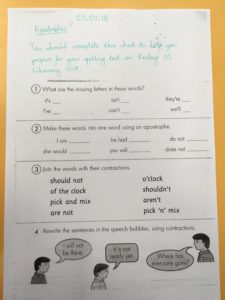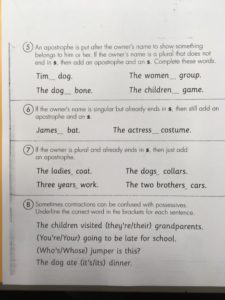02 March 2018
This week’s spelling activity is a rollover! Due to the weather, we weren’t able to discuss our findings yesterday. We did, however, manage to discuss them today and we’ve come up with the following guaranteed spellings that will be on next Friday’s (09 March) test:
- unique
- misread
- moustache
- before
- misshape
- colourful
- beautifulRemember – there will be three surprise spellings on the day!
- Can you show your words in a creative way?
- Can you write them in your own sentences?
- Can you write your words in a paragraph or short story?
- Can you create a poster to show the spelling rules we’ve covered so far?
23 February 2018
The words this week all require you to drop the y for an i before adding er or est. As children could be tested on any of the variations of the words, we only have five to learn.
| happy happier happiest |
| grumpy grumpier grumpiest |
| shiny shinier shiniest |
| smelly smellier smelliest |
| pretty prettier prettiest |
23 February 2018
This week, we’ve been learning about words which contain the ‘a_e’ and ‘i_e’ split digraphs.
| fame |
| shame |
| snake |
| take |
| time |
| smile |
| shine |
| crime |
23 February 2018
At the midpoint in the year, this week’s spelling activity is to revise all the spelling rules and lists that we have learnt so far.
- Can you show your words in a creative way?
- Can you write them in your own sentences?
- Can you write your words in a paragraph or short story?
- Can you create a poster to show the spelling rules we’ve covered so far?
Children should revise the rules in preparation for a test on Friday 02 March. (We’ll discuss our revision on Thursday 01 March to formulate a list for the following day.)
23 February 2018
Apostrophes
Recently, in our writing, I’ve noticed that children are still making lots of errors with apostrophes. Apostrophes can be used in three ways:
- for contraction – we’re (instead of we are)
- for singular possession – Tim’s ball (the ball belongs to Tim)
- for plural possession – the dogs’ bed (the bed belongs to more than one dog)
This week, children have been given a worksheet to help them revise the use of apostrophes. They should be ready for a spelling test on Friday 02 February 2018.


23 February 2018
This week’s spelling list continues our exploration of the Year 5,6 spelling list and we move on to the ‘p, q, r’ section.
There will be a test on these words on Friday 02 March.
parliament
persuade
physical
prejudice
privilege
profession
programme
pronunciation
queue
recognise
recommend
relevant
restaurant
rhyme
rhythm
02 February 2018
The spellings this week are all words which have an -al or a -il ending.
| metal |
| pedal |
| capital |
| animal |
| hospital |
| pencil |
| nostril |
| fossil |
02 February 2018
Next week, we’re learning about words which contain the ‘wh’ and ‘ph’ digraphs.
| which |
| wheel |
| when |
| whisper |
| phonics |
| graph |
| phone |
02 February 2018
Revision
As it is the last week of this half-term, instead of being given a list of words to learn, you should revise all the rules we have focused on so far this year. You will be tested on these rules on Friday 09 February 2017.
Use the spelling page of your homework book to evidence your revision.
02 February 2018
Create ways for you to remember how to spell these words and generally practise using the strategies in the back of your homework book. Don’t forget to try adding prefixes and suffixes to the words. Spelling practice is best done little and often so make sure you come back to the spellings at least three times in the week. Date your practice and ask an adult to sign it to show that you’re practising regularly. There will be a test on Friday 07 February.
- language
- leisure
- lightning
- marvellous
- mischievous
- muscle
- necessary
- neighbour
- nuisance
- occupy
- occur
- opportunity